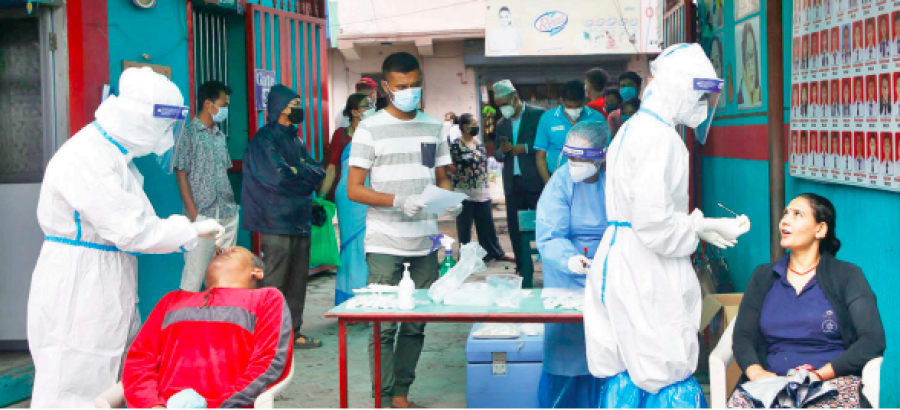National
Public health experts criticise decision to test all returnees within five days
Although testing all returnees is a good idea, it needs to be done at least after eight days, they say.
Arjun Poudel
The government’s recent decision to test everyone returning to Nepal from abroad within five days of their arrival has been criticised by public health experts.
The decision does not minimise the risk of transmission as many infected people may test positive only after at least eight of being exposed to the virus, they say.
“We will soon make available polymerase chain reaction tests for all returnees from foreign countries after they spend up to five days in holding centres, and send them home,” Dr Roshan Pokhrel, chief specialist at the Ministry of Health told the Post. “We will also ask them to stay in strict home quarantine for 14 days after getting home.”
The ministry’s decision, announced on Sunday by spokesperson Dr Jageshwor Gautam, comes as the number of people coming to Nepal from abroad has dwindled to less than 3,000 every day.
“The median incubation period of coronavirus is five days, which means half of the infected people can be diagnosed only after five days,” said Dr Anup Subedee, an infectious disease consultant. “Five days is too short a period for PCR tests. The results may come negative even for people infected with the virus.” It can take upto 14 days for a positive test result in the case of some people already carrying the virus.
“Testing all returnees is a good thing, but the virus may not be detected in five days,” Dr Sher Bahadur Pun, chief of clinical research unit at Sukraraj Tropical and Infectious Disease Hospital, told the Post. “Those Infected people but tested negative in five days can easily pass virus in the communities. ”
An infected person can spread coronavirus only about a week after contracting it as the incubation period (time between the exposure and symptoms onset) for the virus is on an average five to six days. But the presence of the coronavirus can be detected in up to 90 percent of the infected people, if tested they are tested after eight days of exposure, said Subedee.
“If the government can’t place them [returnees] in quarantine for 14 days, it should at least keep them from eight to 10 days to cut the risk of local and community transmission,” he added.
At present, authorities send Nepalis flying into Kathmandu to holding centers, from where they are sent home on reserved buses. Chances of transmission of the infection inside the bus and in communities is already high now, experts say.
The new provision is going to increase the risk further, they add.
“Earlier, hundreds of people got infected in makeshift quarantines set up in various districts throughout the country,” a senior official at the Covid-19 Crisis Management Center, told the Post, on the condition of anonymity as he wasn’t allowed to talk to the media. “Now [with the government’s new plan] holding centers will become the new virus spreading centers.”
At least eight Nepal Army personnel managing the holding centers in Kathmandu Valley have already tested positive for coronavirus. Dozens of others returning from abroad and staying in such centers waiting to go home have also tested positive.
“The whole concept of holding centers is wrong, as people returning from different countries on separate flights are being kept in one place,” the official said. “Even those who are not infected are also getting infected at these holding centers.”
“Fourteen days of quarantine should be made mandatory, and attention should be paid to improve the condition of quarantines.”
Some of the returnees staying at the holding centers are seeking tests on their own at Tribhuvan University Teaching Hospital, Bir Hospital and Patan Hospital. But authorities concerned are not bothered to stop them from going out on their own even after doctors at the Tribhuvan University Teaching Hospital recently drew their attention over the risk of transmission through such people.
The administration offices in the districts bordering India have been sending people returnees from India directly to their home districts on public vehicles. As they stay in quarantine only after reaching their own district, there’s a high chance of transmission of the virus,Health Ministry officials say.
“Quarantine facilities should be improved and established near border crossings,” an official at the Health Ministry told the Post on the condition of anonymity as he wasn’t authorised to talk to the media.
Around six percent of the total Covid-19 cases in Nepal have been found in people who don’t have a history of travelling to disease-hit areas of coming into close contact with an infected person, according to the ministry.
As of Monday, 17,844 people have tested positive for Covid-19 in the country and 40 deaths have been attributed to the disease.




 9.7°C Kathmandu
9.7°C Kathmandu














